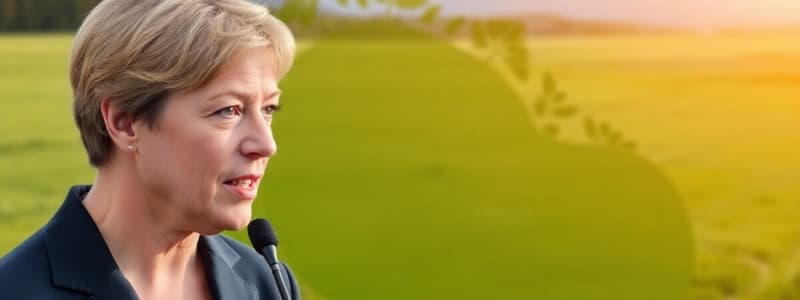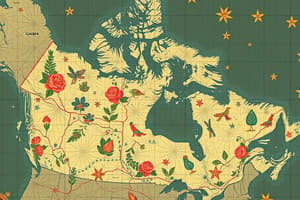Podcast
Questions and Answers
What does LDC stand for in the context of economic development?
What does LDC stand for in the context of economic development?
- Local Development Coalition
- Liberal Democratic Community
- Lack of Development Consideration
- Less Developed Country (correct)
Canada is an example of a Less Developed Country.
Canada is an example of a Less Developed Country.
False (B)
What is one of the primary political issues faced by developing states?
What is one of the primary political issues faced by developing states?
Lack of industrialization
The European Union is an example of a __________.
The European Union is an example of a __________.
Match the following political cultures with their descriptions:
Match the following political cultures with their descriptions:
Which of the following issues is commonly faced by both developed and less developed countries?
Which of the following issues is commonly faced by both developed and less developed countries?
A developed country is more likely to have higher inflation than a developing country.
A developed country is more likely to have higher inflation than a developing country.
Name a possible employment opportunity for someone with a political studies background.
Name a possible employment opportunity for someone with a political studies background.
Which of the following statements is true regarding Newly Industrializing Countries (NICs)?
Which of the following statements is true regarding Newly Industrializing Countries (NICs)?
Developing countries are classified as Newly Industrializing Countries (NICs).
Developing countries are classified as Newly Industrializing Countries (NICs).
What is the primary focus of corporatism as a political system?
What is the primary focus of corporatism as a political system?
The Kuznets Effect suggests that economic inequality __________ during early economic development and decreases after a certain average income is reached.
The Kuznets Effect suggests that economic inequality __________ during early economic development and decreases after a certain average income is reached.
What is the primary purpose of a regime in international relations?
What is the primary purpose of a regime in international relations?
Which political system is most commonly associated with developed states?
Which political system is most commonly associated with developed states?
The security dilemma occurs when a state's efforts to increase its security have no effect on its rivals.
The security dilemma occurs when a state's efforts to increase its security have no effect on its rivals.
Both developed and developing states face issues related to human trafficking and drug trade.
Both developed and developing states face issues related to human trafficking and drug trade.
What is the term used for the situation where one state's gain is another state's loss?
What is the term used for the situation where one state's gain is another state's loss?
The ______ is considered the most important actor in international relations.
The ______ is considered the most important actor in international relations.
What is the main difference between a regional institution and a state?
What is the main difference between a regional institution and a state?
Match the following terms with their definitions:
Match the following terms with their definitions:
Which of the following theorists is associated with realist theory?
Which of the following theorists is associated with realist theory?
Liberals and realists both recognize states as the only legitimate actors in international relations.
Liberals and realists both recognize states as the only legitimate actors in international relations.
What is the purpose of regional institutions in relation to states?
What is the purpose of regional institutions in relation to states?
Flashcards
European Union Institutions
European Union Institutions
The European Union's decision-making bodies, including the European Parliament, the European Council, the Council of the European Union, the European Commission, and the Court of Justice of the European Union.
Regional Institution vs. State
Regional Institution vs. State
Regional institutions, unlike states, have limited power to command legitimacy and influence.
Newly Industrializing Countries (NICs)
Newly Industrializing Countries (NICs)
Countries experiencing rapid economic growth and industrialization.
Developed States Political System
Developed States Political System
Signup and view all the flashcards
Developed States Political Culture
Developed States Political Culture
Signup and view all the flashcards
Kuznets Effect
Kuznets Effect
Signup and view all the flashcards
Developed State Economic Development
Developed State Economic Development
Signup and view all the flashcards
World's Largest Economies (GDP)
World's Largest Economies (GDP)
Signup and view all the flashcards
Developed Country (DC)
Developed Country (DC)
Signup and view all the flashcards
Less Developed Country (LDC)
Less Developed Country (LDC)
Signup and view all the flashcards
Political Culture in DC
Political Culture in DC
Signup and view all the flashcards
Political System in DC
Political System in DC
Signup and view all the flashcards
Primary Issue in Developing States
Primary Issue in Developing States
Signup and view all the flashcards
EU (European Union)
EU (European Union)
Signup and view all the flashcards
Sovereignty
Sovereignty
Signup and view all the flashcards
Political Economy Approach
Political Economy Approach
Signup and view all the flashcards
Security Dilemma
Security Dilemma
Signup and view all the flashcards
State
State
Signup and view all the flashcards
Structural Anarchy
Structural Anarchy
Signup and view all the flashcards
International Governmental Organization (IGO)
International Governmental Organization (IGO)
Signup and view all the flashcards
Zero-Sum Game
Zero-Sum Game
Signup and view all the flashcards
Regime
Regime
Signup and view all the flashcards
Balance of Power
Balance of Power
Signup and view all the flashcards
Realist Theory
Realist Theory
Signup and view all the flashcards
Study Notes
Module 6 and 7 (Chapters 9, 10, 11, 12, 13, and 14)
- Oil and gas may not remain the primary global energy source; renewable options are possible (e.g., electric cars, solar power)
- Canada's role in international conflicts is a complex issue; involvement depends on the negative impact.
- Key concepts throughout the book include the transition from cynicism to skepticism, liberalism, nationalism, political processes, globalization, branches of government, media influence, power dynamics, and conflict resolution.
Chapter 14
- Cynicism toward politics is a harmful societal issue leading to apathy.
- Voter apathy can arise from lack of education or inconvenience.
- Canada's political system is characterized by a limited government role in the economy, high levels of government regulation, and a parliamentary system with a fusion of powers.
- The Governor General is the Head of State, the Prime Minister is the Head of Government. Election dates can vary.
- The comparative approach in politics examines diverse political systems. Canada functions as a democratic society.
Module 6: Politics in Developed and Developing States
- Developed countries (DCs) are characterized by sustained industrialization, while less developed countries (LDCs) lack the resources or capacity for it.
- Examples of DCs include Canada, and examples of LDCs include Mexico.
- Both DCs and LDCs face similar challenges such as human trafficking, drug trade.
- In a DC the most common political culture is polyarchal, with high citizen participation and a pluralistic system, emphasizing democratic values.
- Examples of Political systems are Federal and Unitary.
- Nation-state: The national government has supreme power and responsibility.
- Franchises are an example of exercising final authority over citizens (e.g., Walmart).
- A primary political issue in developing countries is a lack of industrialization or capacity to develop goods.
- The EU is an international organization composed of 27 European countries. It forms a trade bloc for economic, social, security policies. It is structured as a confederation, lacking a single governmental entity.
General Concepts
- Humanitarian Intervention: Interference with a sovereign state's affairs to alleviate suffering.
- Terrorism: Violence aimed at achieving political objectives through instilling fear, stemming from both state and non-state actors.
- Responsibility to Protect (R2P): A UN adoption of international responses, shifting from state security to individual security.
- Jus ad bellum: Principles that govern when a state may resort to war.
- Jus post bellum: Principles that govern the conduct of peace negotiations and post-conflict reconstruction.
- International Governmental Organization (IGO): An institution consisting of states to achieve common objectives.
- Non-governmental Organization (NGO): Non-profit organizations dedicated to international issues, often advocating for political, social, and environmental issues.
- Multinational Corporations (MNCs): Large firms operating in multiple countries, often influencing political decisions.
- Zero-Sum and Positive-Sum Systems: A zero-sum system implies that for one party to gain, another must lose; a positive-sum system states that gains can occur without any losses.
Realist and Liberal Theories
- Realist theory emphasizes competition and the significance of states' self-interests in international affairs, exemplified by Morgenthau's works.
- Democratic peace theory posits that democracies are less likely to engage in conflict with each other.
Studying That Suits You
Use AI to generate personalized quizzes and flashcards to suit your learning preferences.




